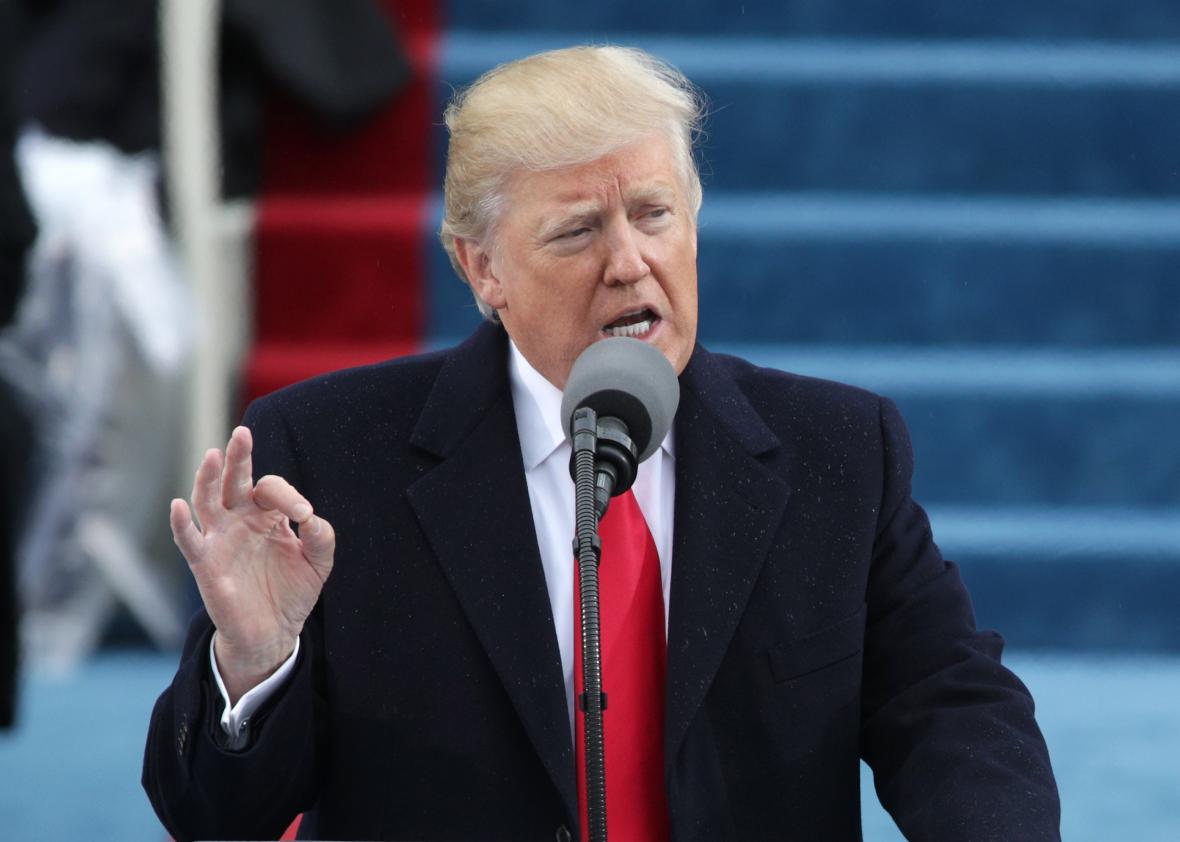If most people behave like people, Trump behaves like some sort of rudimentary silhouette cut from the cloth of literature or myth. He’s strikingly archetypal: the consummate narcissist, the consummate chauvinist, the consummate unscrupulous businessman. And in a recent, exhaustively reported New York Times story pooling light onto the White House after dark, he evokes a figure immediately recognizable from the mists of cultural tradition: a petulant, lonely, tyrannical king.
In Maggie Haberman and Glenn Thrush’s piece, titled “Trump and Staff Rethink Tactics After Stumbles,” a new, damning media caricature of the president emerges. Behold Trump retiring upstairs at 6:30 p.m. to “recharge, vent, and intermittently use Twitter.” Save for one longtime aide, he is “almost always by himself”; Melania and Barron have chosen to remain in New York City. There he lurks, “watching television in his bathrobe,” and often “offering a bitter play-by-play of critics like CNN’s Don Lemon” when they mock him on cable news. Trump also takes the twilight hours to page through press clips with communications director Sean Spicer, “marking the ones he does not like with a big arrow in black Sharpie.”
Could the portrait get any bleaker? The president, a man “of flexible ideology but fixed habits,” sits “cloistered in the White House” with “little access to his fans and supporters.” He “feels increasingly pinched by the pressures of the job and the constant presence of protests.” He struggles to concentrate on policy memos. Perhaps Trump’s isolation explains his mania for the pomp and glamor of the Oval Office. The lavish décor, Haberman and Thrush write, “validates him as a serious person” and provides “an image-burnishing backdrop” to his restlessness. Trump, they report, eagerly inspected a catalog of 17 window covering options before selecting golden drapes to replace Obama’s scarlet curtains. (He claimed the hangings belonged to FDR; they belonged to Bill Clinton.) Smitten with its majesty, he has instructed his staff “to schedule as many televised events in [the Oval Office] as possible.”
Trump often seems to defy comprehension. But 2,000 years after Agamemnon, and 400 after Lear, we know the man in this NYT article. He is the capricious, brooding monarch ensconced in melancholy. The vain king engaged in hollow self-flattery while his empire buckles under him. His family lives apart; a lone advisor haunts the winter of his discontent. He is petty and exacting, obsessed with praise and with his reflection on TV. He is rigid. At night he scrolls through Twitter and polls his counselors: “Which of you shall we say dost love us most?”
When the story was first published, Trump erupted in wounded rage. “The failing @nytimes writes total fiction concerning me,” he tweeted. “They have gotten it wrong for two years, and now are making up stories & sources!” Spicer chimed in to protest that Trump doesn’t even own a bathrobe.
But such outbursts from Trump and his lieutenant (“Sirrah, the whip!”) only proved the article’s point. One of the uncanniest revelations of this document is that Trump, like those lonely canonical despots, cannot turn himself off. His private personality seems exactly aligned with the impetuous, sour narcissism he exhibits in public.
The 19th century poet William Morris, for instance, could have been scripting Trump in his didactic epic “The Earthly Paradise.” Morris describes “a certain king blinded by pride” whose tantrums “kept many a lord awake.” Though nominally married, “at the dais must he sit alone.” He lies “wakeful when yet low was the sun” (tweeting about Alicia Machado’s sex tapes, perhaps?) and “[counts] up his royal titles one by one … thinking much of things that he had done” (like, say, winning 47.2 percent of the popular vote in Wisconsin?).
Or picture Denethor of Gondor, the querulous ruler gone to seed in Peter Jackson’s adaptation of J.R.R. Tolkien’s Lord of the Rings trilogy. When he is not hungrily contemplating his own jewelry, Denethor is consumed by envy of Gandalf and a concomitant desire for renown. “The Grey Wizard a TOTAL LOSER,” one imagines him shouting, wily restraint temporarily cast aside. “My ratings MUCH BETTER. Denethor vs. Gandalf AN EASY D!!!”
But of course, the closest analogue for Trump is Lear himself—peevish, wrathful, blinded by self-regard, abandoned by the family members he hasn’t pushed away, outwardly vaunting and inwardly feeble. Lear disowns Cordelia because the pageantry of filial flattery means more to him than actual love. He banishes Kent on a whim, much as Trump exiled Corey Lewandowski when the fortunes of his campaign seemed to falter. That England’s paragon of vengeful senility has found a kindred spirit in the White House of 2017 doesn’t just prove “the excellent foppery of the world.” It implies that Americans should read more Shakespeare.
But as astonishing as it is to see the extent to which Trump maps onto a literary type, it’s equally fascinating to watch the paper of record lean in to a characterization more familiar to most of us from our high school English classes. Possible variations on the theme for the future almost write themselves: Like Henry VIII in Wolf Hall, Trump is a leader driven by appetite (and enabled by ambitious yes-men), readily uprooting the norms of his station. Like George III in Hamilton, he loves to act the mad entertainer and to indulge his inner child. Like any number of hubristic antiheroes from Greek drama, he appears helpless to escape the maledictions of his own nature. Perhaps what Trump really needs is a fool who will tell him the truth. But instead he has Bannon, a cable addiction, and what looks, at least to humanities students across the country, suspiciously like a looming tragedy of his own making.
